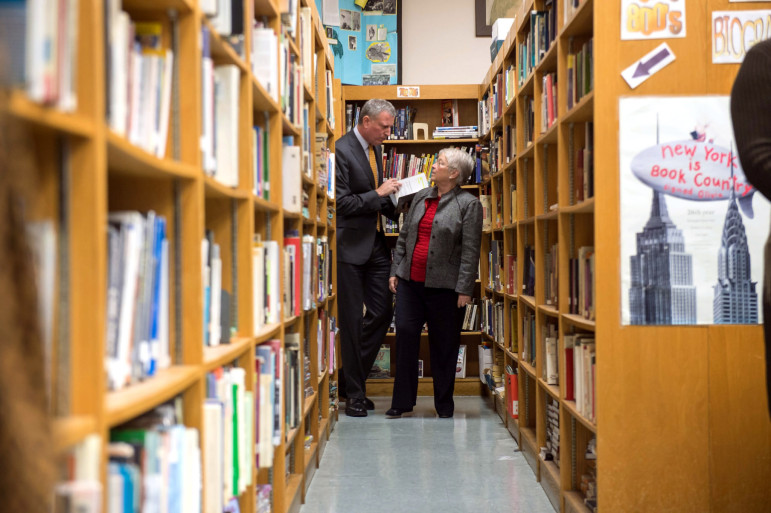
Demetrius Freeman/Mayoral Photography Office
Chancellor Carmen Fariña seen with the mayor at a January 2015 school visit.
While education advocates continue to push for open access to School Leadership Team meetings, a state appellate court ruled this month that the city can continue to bar access while both sides ready for round two in January.
Six months after State Supreme Court Judge Peter H. Moulton ruled that SLT meetings must be open to the general public, a New York State appellate court ruled October 16 that the DOE could continue to block public access to the meetings while the Department of Education files its appeal to Moulton’s ruling.
The ruling was more of a technicality than a decision on any substantive issues, noted education activists, who believe they will ultimately prevail.
“We are still very confident that the court will uphold Justice Moulton’s decision,” said Mark Ladov, of the New York Lawyers for the Public Interest. The Appellate Division of the New York State Supreme Court is expected to hear the DOE’s appeal in January. “Hopefully, we will get a decision that will open SLTs to the public sometime next year.”
While the DOE has argued that individual schools write the bylaws controlling who may attend SLT meetings, last April, Moulton ruled that SLTs came under the state’s Open Meetings Law and therefore had to be open to the general public. Advocate groups like Class Size Matters, part of the lawsuit suing the DOE to open the SLT meetings to the public, have used DOE documents to point out a long history in the DOE of the public being permitted to attend SLT meetings.
SLTs are volunteer bodies with parent members elected by school parents, and include the school principal, the head of the PTA and the UFT chapter leader. Under the guidelines, there need to be an equal number of parents and school representatives.
SLTs help principals write the school’s education plan, make recommendations on how to align the budget with school needs as well as interview prospective principals. The DOE has argued that the groups are strictly advisory, and that allowing the public to sit in on the meetings would have a chilling effect on volunteers’ ability to speak freely.
By allowing the public into the meetings, the city’s Corporation Counsel wrote in an August 20 motion filed in support of the stay, Justice Moulton’s ruling “undermines the essential collaborative nature of SLTs by exposing their deliberative discussion to intrusion and scrutiny by strangers to the school community, including members of the press . . . which necessarily would discourage volunteer members from engaging in the type of free and frank discussion that is so essential to an advisory body.”
While the stay was disappointing, Leonie Haimson, executive director of Class Size Matters wrote in an email, she was hopeful that the plaintiffs would prevail in January, when the Appellate court most likely will rule on DOE’s appeal. The underlying basis of the plaintiffs’ case, she wrote, “remains strong.”









2 thoughts on “Courts Keep School Meetings Closed to Public … For Now”
I am the co-chair of the SLT at a Manhattan elementary school. I am also a lawyer. Our bylaws explicitly say that our meetings are open to the public. For at least the five years that I’ve served on the SLT, nobody from outside the school community other than invited guests has ever attended on of our meetings. Were a member of the public to show up, we would welcome them. The notion that the presence of an outsider would somehow discourage us from engaging in free and frank discussion is utterly absurd.
I have studied the legal issues and I am confident that Justice Moulton was correct when he concluded that New York State’s Open Meetings Law applies to SLT meetings. I very much hope the Appellate Division will affirm his decision.
But DOE shouldn’t be wasting taxpayer dollars litigating this at all. For DOE to argue against transparency does a disservice to parents, teachers, and, most of all, students. Unfortunately, it is not terribly surprising to find DOE on the wrong side of this issue. DOE is not an agency known for either the rationality of its policies or the transparency of its operations. I hope DOE loses this wrongheaded appeal.
This week, on October 25, 2016, the Appellate Court finally ruled on our lawsuit, and in an unanimous decision agreed with the lower court that SLT meetings must be open to the public. Here is the decision:
http://www.nycourts.gov/reporter/3dseries/2016/2016_06989.htm
Here is our press release:
http://nycpublicschoolparents.blogspot.com/2016/10/victory-ny-appellate-court-affirms.html
Here is our blog post about this decision: http://nycpublicschoolparents.blogspot.com/2016/10/a-busy-day-protesting-billionaires.html?spref=tw
There were also articles about this in Daily News, the Village Voice and Chalkbeat. thanks to Tish James, the public advocate, the petitioner Michael P. Thomas, and NYLPI and Advocates for Justice for representing us pro bono. Leonie Haimson, Class Size Matters